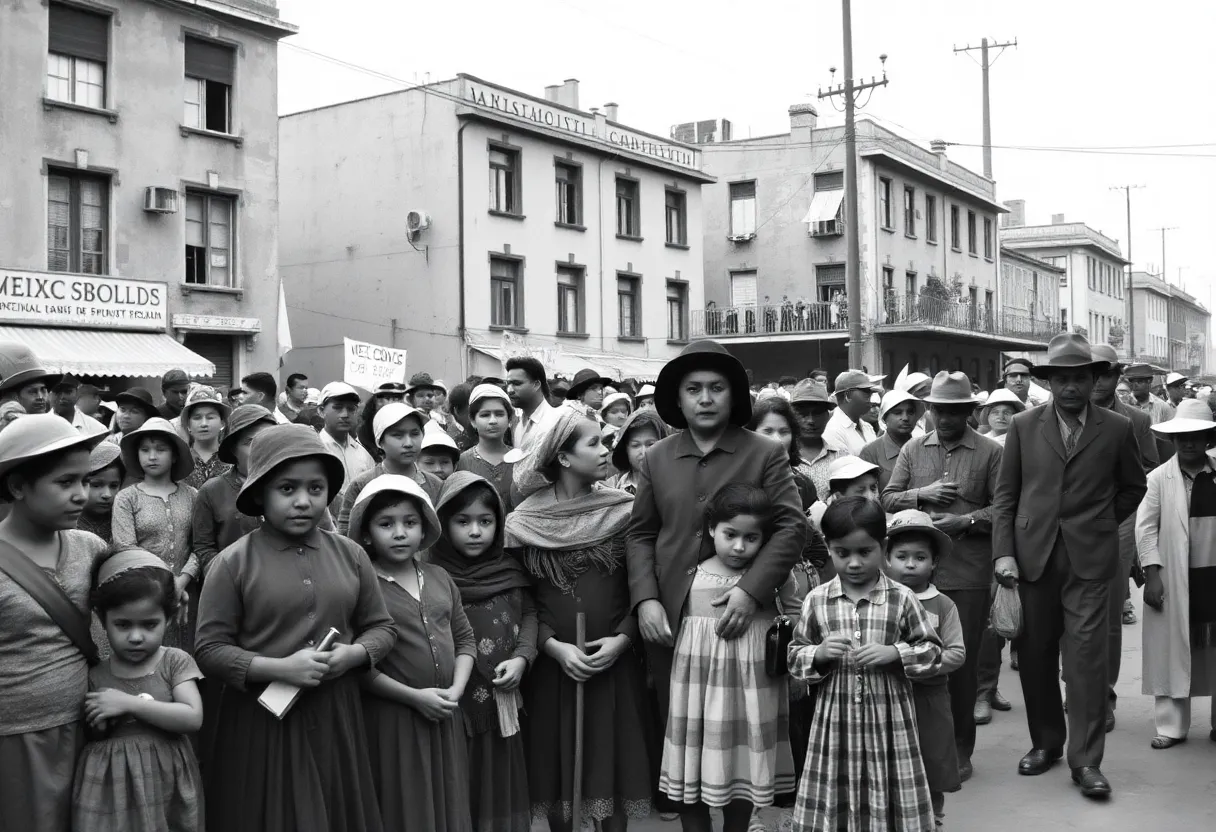News Summary
Recent research reveals the historical injustices faced by Mexican Americans during the Great Depression, linking personal family histories to forced repatriation campaigns. Notably, Adriana Darielle Mejía Briscoe has discovered connections to her great-great-grandfather, who experienced similar struggles. This research underscores the importance of recognizing this dark chapter in American history and advocates for educational initiatives to prevent the cycle of discrimination from repeating in current immigration policies.
Los Angeles Uncovers Historical Repatriation Ties During the Great Depression
Recent research has shed light on the historical experiences of Mexican Americans during the Great Depression, linking family histories to the forced Mexican Repatriation campaigns of the 1930s. In a notable case, Adriana Darielle Mejía Briscoe, an evolutionary biologist at UC Irvine, has uncovered connections to her great-great-grandfather who faced similar injustices.
Background of Repatriation Campaigns
The Mexican Repatriation involved local, state, and federal authorities expelling or coercing around 1 million individuals of Mexican descent to leave the U.S. during the 1930s. Scholars indicate that approximately 60% of those affected were U.S. citizens. The U.S. government initiated immigration raids as part of this campaign, aiming to alleviate economic strains during the Great Depression by targeting immigrant laborers, who were unfairly scapegoated for job losses.
One such raid took place in February 1931 at La Placita Olvera in Los Angeles, where immigration agents detained approximately 400 people, arresting 17, including 11 Mexicans and individuals of Chinese and Japanese descent. This incident exemplified the systemic pressure exerted on individuals of Mexican descent, as authorities demanded proof of legal status and used intimidation tactics to encourage departure.
Personal Connection to History
Through her research, Mejía Briscoe discovered that her great-great-grandfather, Luis Hernández, immigrated to the U.S. in the late 1800s. Hernández was a multifaceted individual, working as both a teacher and poet. His works, including the corrido titled “Despedida,” encapsulate the emotional and social struggles faced by individuals coerced to leave their homes during the repatriation period.
Aside from Mejía Briscoe, other individuals like Christina Valenciana, also affected by family histories of deportation, are advocating for increased awareness of this historical chapter. They stress the importance of teaching this part of American history in schools to highlight the systemic discrimination that took place.
Continuing Legacy of Repatriation
The impact of the Mexican Repatriation echoes through generations, shaping community identity and collective memory among descendants. Activism surrounding this topic remains relevant, as advocates recently held protests at La Placita Olvera to draw parallels between the past and present immigration policies. The rhetoric around immigration today mirrors the sentiments of the Great Depression, where immigrant workers faced unjust accusations for economic hardships.
Organizations and scholars emphasize the necessity of recognizing this historical context, advocating for educational initiatives and monuments that acknowledge the injustices faced during the repatriation. In response to community pressure, California issued an apology in 2005 for its role in these events, marking a step towards recognition and healing.
Confronting Current Issues
The parallels between past and present immigration policies continue to raise concerns among advocates. Mejía Briscoe, Valenciana, and others are now calling for a sustained focus on this history to prevent similar injustices from surfacing in today’s immigration practices. They argue that understanding the collective memory of such events is essential in shaping public attitudes towards contemporary immigration issues.
Through ongoing discussions and educational efforts, there is a shared hope that the lessons learned from the Mexican Repatriation can influence current policies and practices, ensuring that the injustices of the past do not repeat themselves. As awareness grows, the importance of understanding historical context becomes critical to navigating future challenges related to immigration and community identity.
Deeper Dive: News & Info About This Topic
HERE Resources
Additional Resources
- Los Angeles Times: Families Recall Mexican Repatriation
- Wikipedia: Mexican Repatriation
- In These Times: Repatriation and Self-Deportation
- Google Search: Mexican Repatriation
- The Guardian: Trump’s Deportation Plan and the 1930s
- Google Scholar: Mexican Repatriation
- Politico: Mass Deportation in U.S. History
- Encyclopedia Britannica: Mexican Repatriation
- Spectrum News: Mexican Repatriation and Deportation
- Google News: Mexican Repatriation
- Mexico News Daily: America’s Deportation of Mexicans

Author: STAFF HERE COSTA MESA WRITER
The COSTA MESA STAFF WRITER represents the experienced team at HERECostaMesa.com, your go-to source for actionable local news and information in Costa Mesa, Orange County, and beyond. Specializing in "news you can use," we cover essential topics like product reviews for personal and business needs, local business directories, politics, real estate trends, neighborhood insights, and state news affecting the area—with deep expertise drawn from years of dedicated reporting and strong community input, including local press releases and business updates. We deliver top reporting on high-value events such as the OC Fair, Concerts in the Park, and Fish Fry. Our coverage extends to key organizations like the Costa Mesa Chamber of Commerce and Boys & Girls Clubs of Central Orange Coast, plus leading businesses in retail, fashion, and technology that power the local economy such as Vans, Experian, and South Coast Plaza. As part of the broader HERE network, including HEREAnaheim.com, HEREBeverlyHills.com, HERECoronado.com, HEREHollywood.com, HEREHuntingtonBeach.com, HERELongBeach.com, HERELosAngeles.com, HEREMissionViejo.com, HERESanDiego.com, and HERESantaAna.com, we provide comprehensive, credible insights into California's dynamic landscape.


